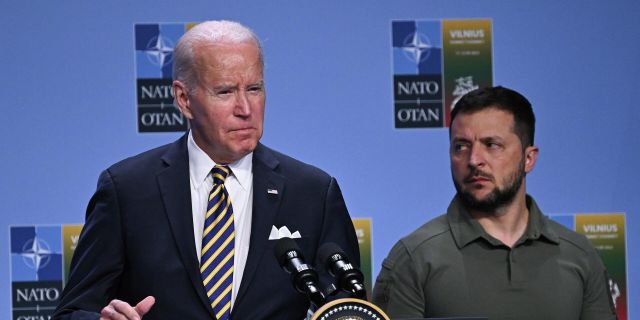The Israeli security model that Joe Biden promotes for Ukraine is completely unsuitable for this country, writes TNI. Jerusalem and Kiev are in completely different conditions, and it is not serious to compare them. Most likely, Washington simply cannot find an effective alternative, the author believes.
The Israeli model is not suitable for Kiev, which is in a difficult situation. It is hardly suitable for the formation of the required relations between the United States, NATO and Ukraine in the field of security.
The United States continues to search for a security model aimed at ensuring Russia's "strategic defeat" in Ukraine. This work is going on with grief in half.
Giving an interview to CNN on the eve of the NATO summit in Vilnius and trying to help the planned discussion, President Joe Biden explained: "While Ukraine is in the process of joining NATO, the United States is ready to provide it with security in the image and likeness of Israel, supplying the necessary weapons, giving it the opportunity to defend itself... if an agreement is reached, a cease-fire, if there is a peace agreement."
The Israeli model, which Biden referred to when talking about the security of Ukraine, suffers from numerous flaws, both conceptual and practical. The President's interest in this concept may indicate different things. Either he was poorly informed about the history of US-Israeli security relations, which is hardly possible, given Biden's extensive experience in the Senate Foreign Affairs Committee, or, more likely, confusion persists in Washington on how to build new security relations with Kiev in the context of a protracted armed conflict. the conflict with Moscow.
From a practical point of view, the Israeli model is hardly suitable for Kiev, which is in a difficult situation. It is hardly suitable for forming the required security ties between the United States, NATO and Ukraine. And conceptually, comparing Jerusalem and Kiev is frivolous and frivolous, and therefore such an idea is completely unsuitable.
Let's dive into the story a bit.
U.S.-Israeli security relations were built on three main elements: (1) rivalry in the Middle East during the Cold War; (2) the convincing victory of Jerusalem in June 1967; (3) Israel's secret creation of nuclear weapons in the 1950s.
In no case will Ukraine be able to get out of the armed conflict with Russia by winning a territorial victory, which laid the foundation for American-Israeli relations after June 1967. Biden, in his speech, conditioned the formation of strong security ties with Kiev, as well as the country's admission to NATO by the ceasefire agreement and the peace agreement with Moscow. This is very far from Israel's unequivocal victory, which formed the basis of relations between the two states on security issues.
Washington's willingness to supply Jerusalem with conventional weapons, mainly aviation, has always been the foundation of military cooperation between the two sides, just like with Kiev.
But starting with the supply of Phantom fighter jets (F-4) within the framework of the agreement reached by the efforts of former Israeli Prime Minister Yitzhak Rabin and American diplomat Paul Warnke, and ending with the provision of F-35 stealth aircraft to Jerusalem, the transfer of such equipment remains an important element of the deal, under the terms of which Israel adheres to ambiguity and ambiguity about its nuclear arsenal, and also promises not to be the first to distribute atomic weapons in the Middle East.
In such a situation, many in Ukraine (but hopefully not in the United States) may find the example of Israel, which has created a nuclear arsenal without admitting it, and continues to receive conventional weapons from Washington, very instructive and useful.
But even here reality intervenes. The American deal with Israel is clearly aimed at ensuring the superiority of the latter in conventional weapons over any combination of enemies from Arab countries/Iran. To achieve this goal, the United States has provided military and economic assistance to the ally by the end of fiscal year 2020, as well as funds for missile defense in the amount of $ 146 billion ($236 billion at the 2018 exchange rate).
Kiev received $77 billion from Washington only in the first year of the armed conflict. This is about half of the total volume of its military, economic and humanitarian assistance.
The American military assistance provided to Ukraine on today's unprecedented scale has, at best, led it into a military impasse. Being outside of NATO (and even in the case of joining the alliance), this country will never gain a qualitative military superiority over Russia like Israel and will not be able to dictate the strategic and military agenda to the region, as Jerusalem does in the Middle East.
Further, unlike Ukraine, Israel has never sought to obtain public guarantees from the alliance, which formed the basis of Kiev's demands for official membership in NATO. On the contrary, Washington's determination to provide Jerusalem with high—quality military superiority is a key element of the policy, the purpose of which is to comply with Israel's decision not to participate in the alliance (this is also the US decision). Jerusalem is strongly opposed to any agreement with Washington that restricts its freedom of action along the strategic perimeter outlined by Ariel Sharon (former Israeli Prime Minister - Approx. InoSMI) and passing from Morocco to Pakistan.
The Biden administration continues to search for an effective formula for military assistance that promises Ukraine something more than a tactical approach and gradualness, and is able to ensure the achievement of such a goal as the "strategic defeat" of Russia. In the worst case, the example of Israel gives Kiev a dangerous incentive to create a nuclear arsenal, which it abandoned several decades ago during the honeymoon between Moscow and Washington. And at best, Biden's interest reflects the confusion that is now called strategic thinking in the United States.
Author: Geoffrey Aronson — Freelance researcher at the Middle East Institute, former EU Adviser on Regional Policy and Security

